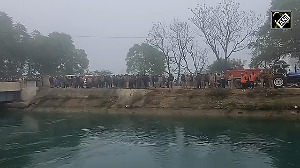"I definitely will not be running in the near future," he told Reuters on the margins of a news conference as he arrived back in England on Monday with running partner Mike Stroud.
Fiennes was coy about his specific plans, but Stroud -- who carried a heart defibrillator with him on the runs in case Fiennes had another heart attack -- was more forthcoming.
Stroud said Fiennes -- who dismissed as a "holiday" the notion of climbing Mount Everest -- had "toyed with the idea of going on an archaeological expedition". He gave no details.
Fiennes called his surgery less than five months ago a "minor setback" in the preparation for the marathon challenge which the pair completed in New York on Sunday.
But Stroud, a practising medic, was less dismissive of the heart attack. "He was unbelievably lucky to survive," he told a news conference, "but he has been replumbed successfully."
Doctors forbade Fiennes, who will turn 60 in March, from raising his heart beat above 130 beats per minute -- a normal speed for an athlete during exercise.
"They said it probably might be alright," he said nonchalantly.
The pair had hoped to run one marathon on each of the seven continents but bad weather forced them to cancel their Antarctic leg and run it on the Falkland Islands instead.
Stroud said the pair suffered blackened toenails, some of which fell off, blood in their urine and extreme muscle fatigue. As muscles broke down they released debilitating toxins, with Stroud's levels 500 times higher than normal by the fourth day. "I am utterly amazed at how far a human can literally 'run on empty'," he said. When the pain hit he diverted himself by dreaming up a design for his daughter Wendy's house.
Both men said the best thing about getting home was escaping from the monotonous carbohydrates of a distance-running diet.
"I do not want to see another bit of pasta as long as I live," said Fiennes.
Stroud added: "I still have not had a cup of tea."








 © 2025
© 2025